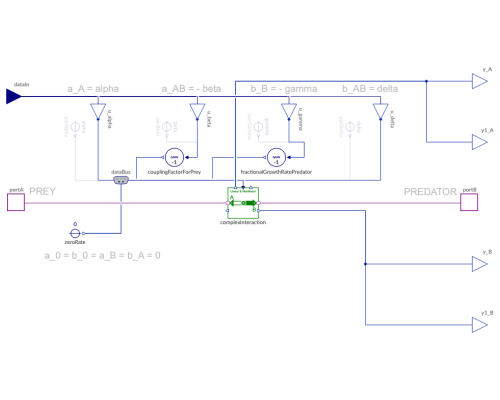LotkaVolterraThe Lotka-Volterra equations to model predator-prey-dynamics |
|
Diagram
Information
This information is part of the Business Simulation Library (BSL). Please support this work and ► donate.
These are the classical Lotka-Volterra equations describing predator-prey-dynamics in an idealized way [17]. The dynamics for the prey population (portA) and the predator population (portB) are given by the following equations:
Note: Capital letters were chosen to represent the stocks (state variables) connected at portA and portB in the formula above. Also dot notation is used for a stock's rate of flow—its first derivative with respect to time.
| Coefficient | Unit | Description |
|---|---|---|
alpha |
1 per second |
fractional growth rate for prey population |
beta |
1 per second per base unit of B ( TypeB) |
fractional rate of decline for prey population per predator |
gamma |
1 per second |
fractional rate of decline for predator population |
|
|
1 per second per base unit of A ( TypeB) |
fractional rate of groth for predator population per prey |
Notes
- Within the components
LinearInteractionandNonlinearInteractionthe rates passed fora_B, a_AB, b_A, b_ABcall for divison by a reference level of the connected stocks. In many cases, modelers can leave the type selectorsTypeA, TypeBat their default value ofUnspecifiedso that no conversion will take place. - Should unit conversion be needed, modeleres may wish to select appropriate type values and corresponding
displayUnitsettings to enter convenient reference levelsrefA, refB.
See also
Parameters (10)
| refA |
Value: 1 Type: TypeA Description: Reference value, i.e., divisor, for the couplings b_A, b_AB |
|---|---|
| refB |
Value: 1 Type: TypeB Description: Refrence value, i.e., divisor, for the couplings a_B, a_AB |
| alpha |
Value: unspecified Type: Rate (1/s) Description: Fractional growth rate of prey population (A) |
| beta |
Value: unspecified Type: Rate (1/s) Description: Fractional rate of decline for prey population (A) per predator |
| gamma |
Value: unspecified Type: Rate (1/s) Description: Fractional rate of decline for predator population (B) |
| delta |
Value: unspecified Type: Rate (1/s) Description: Fractional rate of growth for predator population (B) per prey |
| hasConstantAlpha |
Value: false Type: Boolean Description: = true, if the constant parameter value is to be used instead of the input connector |
| hasConstantBeta |
Value: false Type: Boolean Description: = true, if the constant parameter value is to be used instead of the input connector |
| hasConstantGamma |
Value: false Type: Boolean Description: = true, if the constant parameter value is to be used instead of the input connector |
| hasConstantDelta |
Value: false Type: Boolean Description: = true, if the constant parameter value is to be used instead of the input connector |
Connectors (12)
| portA |
Type: FlowPort Description: Flow from/to Stock A |
|
|---|---|---|
| portB |
Type: FlowPort Description: Flow to/from Stock B |
|
| y_B |
Type: RealOutput_B Description: Rate for flow to and from B (positive value indicates inflow) |
|
| y1_B |
Type: RealOutput_B Description: Rate for flow to and from B (positive value indicates inflow) |
|
| y1_A |
Type: RealOutput_A Description: Rate for flow to and from A (positive value indicates inflow) |
|
| y_A |
Type: RealOutput_A Description: Rate for flow to and from A (positive value indicates inflow) |
|
| dataIn |
Type: InputConnector Description: Inputs for predator-prey model |
|
| u_alpha |
Type: RealOutput Description: Output signal |
|
| u_beta |
Type: RealOutput Description: Output signal |
|
| u_gamma |
Type: RealOutput Description: Output signal |
|
| u_delta |
Type: RealOutput Description: Output signal |
|
| dataBus |
Type: DataBus Description: Expandable connector for multiple data signals (input/output) |
Components (8)
| complexInteraction |
Type: ComplexInteraction Description: Combined linear and nonlinear interaction |
|
|---|---|---|
| zeroRate |
Type: ConstantConverter Description: Zero rate input |
|
| fractionalGrowthRatePredator |
Type: Gain Description: Convert rate of delince to growth rate |
|
| couplingFactorForPrey |
Type: Gain Description: Convert rate of delince to growth rate |
|
| parAlpha |
Type: ConstantConverter Description: Constant alpha (optional) |
|
| parBeta |
Type: ConstantConverter Description: Constant beta (optional) |
|
| parGamma |
Type: ConstantConverter Description: Constant gamma (optional) |
|
| parDelta |
Type: ConstantConverter Description: Constant delta (optional) |
Used in Examples (1)
|
BusinessSimulation.Examples Predator-prey dynamics |
Revisions
InputConnectordefined asencapsulated expandable connectorin v2.1.0.- Values for optional parameters changed to
unspecifiedin v2.1.0. TypeA, TypeBand corresponding reference levelsrefA, refBintroduced to support unit checking and unit conversions in v2.2.
